|

Can you spot all the insects on this daylily flower?
(*photo
by Sally Ramsdell)
September 1, 2019 Humility: Ways to Become Exalted
Everyone who exalts himself shall be humbled and he who humbles himself shall be exalted. (Luke 14:1, 7-14)
"If you do not toot your own horn, no one else will do it for you." Self-promotion is an American trait and thus foreigners studying in this country who seek to enter our labor market tell how difficult it is; they say that self-promotion goes against their own cultures. It is our curriculum vitae-oriented society that seeks to promote us and where we studied, degrees obtained and accomplishments achieved. It is such a part of our life that we hardly think of it -- and yet the story in today's Gospel makes us pause for a moment. At times, St. Paul lists his hardships as honest accomplishments when in union with the Lord.
There are times to flaunt credentials and times to be silent. Let's say you attend an event hoping to be recognized for some work performed selflessly; instead, you are totally ignored and someone else doing what you regard as of far less importance is given public recognition. Only you and no one else (unless they judge from your body expressions) will know that you are humbled by being there, and made to applaud the achievements of the other. Someone who knows better may even come and rub salt in the wound by saying that you were overlooked. Unfulfilled expectations are humbling. When we take such events with grace and humor we are spiritually exalted while humbled -- and are the better for it.
We can humble ourselves in sincere ways and yet do it without fanfare. One way is giving credit to others when some could have gone to ourselves. Through our good graces, partnerships may flourish and others receive a portion of credit, if not more than they deserve. Another humbling opportunity comes when we encourage those who are bashful and retiring, especially when others overlook them. During public events we make an effort to promote and broadcast the importance of humble activities that are so often overlooked. We give thanks to the Lord and credit where credit is due, even at those rare times when people give us credit for successful happenings.
Sometimes humility is accepting the passivities of life such as limited talents or suffering from disease or infirmity. When we do this in good grace, we show ourselves to be humble servants of the Lord. In acknowledging our weaknesses, we still seek to spread Good News even when subject to possible ridicule. When we speak the truth, we may risk being shown our own imperfections. We accept the limits to our work here on Earth and simply say it is the best we can do. We acknowledge that the more talented and spiritually-attuned can and do perform jobs better that we can.
Prayer: Lord, show us many new ways to express humility, for you have called us to great things (much in the pattern of Mary's Magnificat). We do not deserve this calling, but accept it; forgive our imperfections so we express authentic enthusiasm.

White-footed mouse, Peromyscus leucopus, on the move.
(*photo credit)
September 2, 2019 Jobs Galore; Workers Anxious; Funds in Havens
On this Labor Day we again announce the tragedy facing so many of the willing but under- or unemployed. In order to save the precious capital of the wealthy, a system exists where some have a means to a livelihood and others do not. "No new taxes." That is a major form of insidious propaganda. We need fair taxes and that means new taxes on the wealthy who pay the least. Let's not forget some basic facts:
1. We HAVE plenty of job opportunities though these are not presently adequately funded:
* Bridges and roads scream for repair;
* Schools and playgrounds deserve to be expanded;
* Affordable housing is sought by the poor;
* Parks constantly demand better maintenance;
* Blighted areas of cities should be rebuilt;
* Illiteracy could be erased;
* Elderly and the ill cry out for better care;
* Arts and crafts ought to be enriched and taught; and
* Research of every kind deserves promotion.
2. We HAVE plenty of workers:
* Over one-tenth of our labor force under- or unemployed;
* Recent highly qualified and energetic graduates;
* Illegal immigrants and those good citizens vying for
permits to stay in our country;
* Veterans and those who have sacrificed for our nation;
* Retirees wanting to add some benefit in their Indian
summer years;
* Housewives desiring to give extra service for others;
* Those seeking less stressful jobs;
* Prisoners engaged in doing community service; and
* Youth who could learn so much by meaningful work.
3. We HAVE funds but also a contrary economic/political system that will not allow us to liberate them from tax havens and the accounts of the wealthy. Three possible scenarios are possible:
* Fair taxes at state and national levels on excessive wealth. In our Commonwealth of Kentucky the top one percent pays the least taxes and some defend this because they have been thoroughly propagandized;
* International regulations and taxes that would check the current flow of excessive capital from one country to another
(this is being actively proposed by a number of European Union nations); and
* Reduction in military expenditures and use of funds for a far more secure international program, which is designed to support essential services for all the world's needy people.
Prayer: Lord, allow us to stretch the limits on what can be done so the sad specter of under- or unemployment will cease.

The Chaplin River. Washington Co., KY.
(*photo credit)
September 3, 2019 Champion the Intellectual Commons
Here, as a new academic year sets in, is a good time to consider the intellectual treasury of this world and how those who advance frontiers are to be supported and encouraged. Mental achievements are part of our common human heritage and should be available to all; they should be passed on easily to the next generation. Research ought to be fostered and intellectual treasures ought to be extended to others through a free flow of information.
Intellectual research needs to be honored and respected. The scientific revolution opened knowledge to critical review and verification. Time-sensitive copyrights and patents provide compensation to the originators and authors and yet allow materials to be accessible to the general public. The delicate balance between fair return for expenses and time along with adequate recognition of work, and delivery of the innovation to the general public beyond the wall of trade secrecy must be maintained. Restrictions on access to the intellectual commons include: lack of availability to research records, limited library use, lack of freedom of information through trade or governmental secrecy, Internet restrictions, and bans on specific areas of research.
Copyright extension is an infringement on the common intellectual stock and a sequestering of created material from the public domain over a longer period of time. Copyrights have expanded from fourteen years with fourteen-year renewals in the 1790s to copyrights through the author's life plus fifty years in 1976. Furthermore the Sonny Bono Act in 1998 extended the life of the copyright another twenty years -- and in 2003 the Supreme Court ruled that this expanded duration does not violate our American Constitution. Due to this act, in 2030, the number of works in the public domain will be reduced from 25 million at the turn of the century to 10 million.
Intellectual transmission is another problem area because of inadequate education. Basic education and especially reading and writing skills are denied large portions of the general global population through lack of resources, inadequate teachers, poor facilities or danger for some, especially of young women, attending school. Inaccessibility is often the problem. Indebted nations and regions cut educational funds in an effort to meet ends. High costs of education are curtailing the ambitions of lower income people even in many developed countries. In developing lands such as sub-Saharan Africa millions of youth are orphans; in the Middle East millions are refugees lacking a basic educational grounding. Educational barriers to the intellectual "commons" occurs through lack of public and private institutions, inability to transfer appropriate technology, inadequate health care facilities, and lack of the will to share resources. Morally, we are called to do more to champion and further intellectual resources for all people.
Prayer: Lord, help us to share our intellectual heritage.

Southern wild senna, Senna marilandica.
(*photo credit)
September 4, 2019 Let's Halt Overconsumption by the Affluent
Voluntary reductions in consumption patterns by the affluent and those aspiring to be (such as the emerging Chinese and Indian middle and upper classes) cannot be expected to be extensive. It is wrong to focus attention on free-market economics AND free choice. Those who refrain from challenging the current dysfunctional economic system pretend to be constructively critical by calling for voluntary changes. Hogwash! Rather, are they not too timid to admit that their silence favors the status quo and allows it to continue unchallenged?
A consumer-products-subsidized public media can hardly start the critically-needed discernment; this media knows the feeding hand and so it seeks a goal of greater consumption of goods of all sorts. And who is best able to consume but those wealthy enough to buy? Essential "consumption" (satisfying the hungry and those lacking adequate housing) is NOT the problem; over-consumption by a rapidly expanding affluent generation is. The problem is exacerbated by an insatiable appetite for materials by those who are privileged to control resources and are free to consume them as their "wants" move them. Unfortunately, there is a void in the political spectrum of groups calling for MORE consumption for the disadvantaged and LESS consumption, through regulation and taxes, for the affluent. Don't expect champions of comfort to speak. A decade ago, a BBC commentator asked why should BP (when fishers were being economically wiped out by the BP oil spill) give its billions of dollars in quarterly dividends to stockholders. Where do priorities lie in a loosely regulated society? BP did pay billions in costs and fines before it was all over.
The practice of overconsumption by affluent consumers spreads globally as an epidemic, threatening the lives of people, requiring immense amounts of resources, the processing of which emits more and more carbon dioxide and other air and water pollutants as well. Amid the hype, the world continues to mount climate change emissions. Despite all the "green" talk, the CO2 levels continue to climb and approach catastrophic levels. An unchecked license for affluence will make or break this planet, for unregulated consumer economics is unsustainable at present and expanding levels especially in Asia. Annually, ten million join the consumer class.
Overconsumption (from forest products to use of grain for fuels) must be exposed especially through the relatively free portion of the Internet -- the ad media will not do it. We must show that alternatives for a higher quality of life have benefits and that balanced consumption can exist today. Consume less; warn others what overconsumption does to people, communities and Earth herself; find ways to frustrate overconsumption practices through regulation, abolition of tax havens and fair taxes on the affluent.
Prayer: Lord, encourage us to take up the unpopular fight of redistributing limited resources to a world with essential needs.

Bee enjoying "butterfly" milkweed, Asclepias tuberosa.
(*photo
by Sally Ramsdell)
September 5, 2019 New "Fire Season" Suggestions
About one in ten Americans (including this author) live adjacent to wilderness and heavily wooded areas -- and could suffer from wildfires (see May 4, 2016). Some of us live in rural parts of Appalachia or other mountainous regions; others live in suburban regions that are adjacent to wilderness containing combustibles. In fact, almost half of Americans live or have relatives who live near wilderness. A checklist by "Kentucky Firewise" is worth noting:
* The driveway should accommodate fire department vehicles.
* House address numbers (at least four inches tall) ought to be highly visible on the house and at the entrance of the driveway.
* Structures are to be combustion-free. This includes fire-resistant exterior construction such as cement, plaster, stucco and concrete masonry; cordwood walled buildings are essentially fire-resistant. Keep gutters free of dead leaves, moss, pine needles and twigs. Enclose decks where possible. Mobile homes should have underpinning/skirting materials to keep out combustible materials.
* Fire-fighting instruments are good insurance. A ladder, fire extinguisher, and hand tools such as rakes, shovels and axes should be readily available. A hose that reaches all the way around the house is to be readily available (a 100-foot hose is recommended).
* Chimneys are needed for wood-burning sources of heat but these can be dangerous. A spark arrester should be installed on an active chimney (a one-half-inch mesh screen is recommended). Branches are pruned back fifteen to twenty feet from that chimney.
* Landscaping should include fire-resistant plants, shrubs, and trees (e.g. ash, basswood, birch, blackgum, buckeye, cherry, crabapple, dogwood, elm, hackberry, hawthorn, hazelnut, hickory, horse chestnut, KY coffeetree, locust, magnolia, mulberry, oak, pawpaw, peach, plum, poplar, redbud, spicebush, sweetgum, walnut).
* Greenspace (and veggies) may cover thirty feet of safe space around buildings. Landscape should be kept mowed and free of thatch of any sort. Stack no firewood within thirty feet of the house. Note: We recommend evergreens as wind barriers, but these should not be closer than 30 feet from house.
* Escape plans should be developed and discussed with all residents.
* Homeowner's insurance policies have adequate coverage for the costs of rebuilding and repairs needed in the case of a catastrophic wildfire. Rates rise with wildfire frequency.
* Propane (LPG) tanks are kept at least 10 feet from a building. Keep surroundings free of combustible material.
Prayer: Lord, keep us safe and safety-conscious.
Myths about Green New Deal
The Green New Deal GND) has triggered immense negativity from powerful and influential American sources. Why? Partly because a proposal by AOC, one of the few initialed titles to be widely recognized in U.S. history -- and freshman congressperson! More importantly, the reason is that big economics is at stake, namely the vast profits of the Big Fossil Fuel Industry. Teddy Roosevelt’s "Square Deal" in 1902 had some opposition as did Franklin Roosevelt's "New Deal" in 1933, during the depth of the Great Depression. Let's first address the negative GND myths:
Myth: GND is unworkable. Results will depend on the willingness of citizens, as in the 1930s. Original New Deal projects proved enduring (roads, bridges, etc.); they remain working examples and worthwhile testimony to the Works Progress Administration (WPA) and Citizen Conservation Corps (CCC). A renewable economic system in the 2030s will be GND's enduring fruit.
Myth: GND is partisan. Not so, for the idea has been in its elementary stage since the first Earth Day in 1970 -- and it was bi-partisan from the start. In fact, the latest surveys show 40% of Republicans back the idea of a Green New Deal, along with a larger but by no means absolute majority of Independents and Democrats.
Myth: GND is far-fetched. GND involves resource conservation on the part of individuals; this is already being practiced by many and is enhanced by current workable governmental programs at state, regional and urban levels. What is really "far-fetched" is continuation of subsidies to an outmoded fossil fuel system.
Myth: GND is expensive. Freeing up an estimated $20 billion per year in subsidies and tax write-offs for fossil fuels (data by the Environmental and Energy Study Institute) and moving these funds to renewables would furnish a healthy one-quarter of a Trillion dollars by the early 2030s. This allows growth of solar, wind, geothermal, hydro and other renewable energy sources.
Myth: GND is socialist. This is pure name calling for a new deal that is novel and untried. Such a deal will involve individual and private investor participation just as current renewable energy is advancing at non-federal levels. Certainly government is needed as are individual efforts (see Appendix).
Myth: GND is anti-burgers. Not so, in fact the rapid advance of plant burgers results from the desire to curb meat resource costs, and yet match current meat looks, taste, texture and nutrition. Voluntarily choosing to eat plant-burgers could increase plant life and reduce the 15% methane generation by livestock.
Myth: GND is radical. Yes, but being radical at the fundamental root of solving current impending disaster is good sense; it's the negative meaning of "radical" that is challenged.
Potential Elements of Green New Deal
The Green New Deal is a federal program in its infancy; the following are some elements, many of which are already proposed in legislation or passed by the current House of Representatives:
1. Promote renewable energy applications. At current rates (through mostly private investment) solar and wind are rapidly replacing coal and petroleum. Much of subsidies now going to fossil fuels could be transferred to renewable R&D and applications, especially in military and governmental applications. Renewable energy sources now exceed nuclear power generation and will soon exceed coal as well. Nothing really stands in the way of renewable energy except influence and profits of Big energy. Curbing climate change could occur successfully with will power and political stamina in a bi-partisan effort in the next few years.
2. Reinstate energy efficiency standards for autos and all home appliances as well as for electricity production. Many of these have been weakened by the current Administration.
3. Encourage individual conservation measures through educational means. (See Appendix for examples). Back this with encouragement of state and localities to require recycling, packaging controls, and cleanup of the environment.
4. Create a GND Service Corps putting many younger people to work installing a comprehensive micro-grid system for renewable energy use, along with solar and wind applications in poorer regions of our country and world; accompany this with reforestation programs and individual tree plantings. Payment for services could be through reduction of current academic indebtedness situations.
5. Institute a carbon tax on use of fossil fuels; besides raising funds to help support the Service just mentioned, it would help curb CO2 emissions and enhance renewable energy sources.
6. Plant-protein promotion is popular and just starting; the extent of meat and animal products impact on the environment is being verified and needs to be publicized to a broader public.
7. National infrastructure maintenance must be an accompanied priority. Funds could easily come from a wealth tax, for all of us benefit from improvement of roads, bridges, airports, shipping facilities and public transport. The needs are vast and growing.
8. Keep posted on zero carbon imprint programs. The number of towns and cities now seeking to be carbon neutral is growing steadily. The fact that some are far behind can become a public incentive for localities to move to climate change curbing activities. Grants and up-to-date posting are positive forms of competition in this transformation, which must occur ASAP.
Appendix (Individual Actions)
What about my heating and cooling demands? Overheated houses in winter (above 60 degrees Fahrenheit) and below 70 degrees in summer take heavy tolls on home heating and air-conditioning (AC). Do we need air conditioning, or are fans sufficient? If due to hot summers AC is necessary for residents, then conserve on AC use by carefully monitoring residential and business space and time.
Do I watch my ordinary travel use? The average auto user through careful planning can reduce number of trips. Can these be achieved through carpooling with others? If I can't afford a fuel efficient electric car, can I continue to practice safe driving and good maintenance (tires, oil change, etc.)? Do Internet purchases save trips, even when face-to-face visits have social merit? Are public transport applications a possible resource saving?
Do I use electronic devices sparingly? Using electronic devices excessively is becoming an addiction. The Internet demands energy to function as do computers, home and office appliances and rechargeable computer hand-held devices. Do I leave electronic devices in operative mode even when not needed?
Do I consider curbing meat consumption? It may or may not mean deciding to go vegan or vegetarian. Nevertheless, if considered on a massive scale of global food consumption, curbing use of animal products, which take energy and a major portion of arable space to feed and maintain, is one way of sharing limited world food resources with others. The Wall Street Journal laughs about methane-generating farting cows, but belittling global efforts at reduced meat consumption only shows affluent insecurity.
Am I aware of the origin of my foods? Do I control my taste for exotic foods from distant places or for out-of-season foods? Transportation costs to bring them to me are sizeable. Do I grow some of my own food or assist neighbor gardeners? Do I patronize local food growers? Do I read ingredients and avoid many processed foods with heavy sugar, fat and salt content? Do I promote eating seasonal, unprocessed organic foods?
Do I recycle and use less packaging? Do I reduce the use of plastic bags by bringing my own packaging sacks? Do I try to purchase bulk foods and use less paper towels? Individualized water bottles and drinks take enormous amounts of packaging material in comparison to use of a tap water (perhaps using a purifying device). Do I sort paper, metals and plastics for recycling or take the added steps of not using discardable materials in the first place?
What about vacation resource costs? Can we take long-distance vacations rarely, and make more frequent ones closer to home? The particular energy expenditure depends on distance travelled, number of passengers in a vehicle, and type of aircraft used for travel. A single private jet trip can exceed annual energy of an entire African village. Do my trips benefit others?

Bee on wild rose.
(*photo
by Sally Ramsdell)
September 6, 2019 Consider Travel Checklists
Why the formality of a checklist for any major event or travel venture? The reason is simple: the vast majority of us are forgetful when it comes to a host of details assembled in a short time. In fact, we probably shun people who go into too much detail about little things because we prejudge that they never think deeply on important issues. Why should we consider a checklist after much spring and summer travel? One answer now is that we can easily recall the items missed and those that went unused when we traveled earlier this year. Did we note upon our return the items we had lugged along and then never used? Did we check upon leaving each place so we didn't leave something? Did we appreciate the lists we did make and how often these came in handy?
A method for constructing the checklist may help. It may be by alphabetical order though that is challenging to construct. A more practical approach is grouping items according to the containers and luggage to be used, namely a box for food, an place for camping gear, a suitcase for clothes, a fanny pack for emergencies, and a briefcase for valuables.
Services to be performed need a listing as well: care for pets, mail or garden; selection of electronic devices to take or turn off; bills coming due during travel period; people to contact before leaving; and essential financial arrangements.
Emergencies do happen and should be anticipated as a possibility. Make a list of things that can be read or worked on while stalled or stranded on a trip. The first consideration is that unexpected waits are always good times to pray; they are also periods to think, reflect, plan and sketch out future routes to travel. Make sure to have a writing instrument and paper handy. Consider all that might be packed into a fanny pack: underwear, socks, handkerchief, small amounts of soap, shampoo and toothpaste, toothbrush, comb, pen, notebook and other essentials such as medicine (and passport if not worn on a chain). One friend whom I told about my pack was stranded for a week at an airport on 9-11-01; he expressed deep regret for not having had one with him.
Time for constructing the list is crucial, but may be shortened by using a former list from the files. System comes into our lives ever so gradually. A checklist keeps down overpacking, and ought to reflect past experience of over or sometimes underpacking. Remember that unnecessary added weight reduces the comfort of the travel and is an energy and space waste (one pound of additional items is one ton-mile on a two-thousand- mile trip).
Retain the checklist for future ventures. Perhaps it is wise to insert it in the infrequently used but stored travel bag.
Prayer: Lord, help us to confront our own forgetfulness and to prepare for it in advance by constructing checklists, especially when we are traveling to unfamiliar places.

"Mysterious Red Bottom" by m.gifford (Creative Commons).
September 7, 2019 Grow a Variety of Autumn Greens
In our part of the country, this week is generally the last time to sow seeds in order to have a good stand of late autumn greens. Of course there are trade-offs, for many prefer a cover crop for the fall and winter in order to prepare the ground for spring. I generally regard the greens that last through the winter as cover, and so pluck early spring greens while allowing the remaining vegetative matter to be turned under. Those of us with minimal garden space need to consider this dual factor at work. If your intent is to plant legumes in order to enhance nitrogen content, one alternative practice is to add diluted urine to the soil during the seasons.
Turnips a mainstay? If we need a single vegetable for the autumn, the humble turnip is good, for in milder winters this can furnish food for us well into the following spring. I have always enjoyed harvesting turnips even in winter with a leafy cover to protect them from drying out from freezing and thawing.
Do you prefer variety? I like autumn greens from my earliest years when we grew mustard, endive and kale -- and Mama would sell some of the produce at the local vegetable market. Added to planned leaf crops are a variety of brassicas such as collards (a standard Southern winter crop) along with broccoli, Brussels sprouts, kohlrabi, cabbage, and cauliflower. Spinach and arugula as well as Swiss chard are good autumn crops as are beet greens. The French enjoy autumn endive and a variety of herbs. Celery that has been maturing through the summer is protected by mounding with earth. Consider Japanese Daikon radishes as a good fall variety for they can grow to very generous roots. How about salsify (plant early in the year) that makes good late autumn and winter dishes? Another leafy Oriental addition is Pak Choi; it's delicious when well protected from windburn.
What about your microclimate? In our more temperate climate with warmer autumns, many crops traditionally considered spring ones (peas, onions and radishes) do very well in autumn because hot weather that leads to premature seeding does not follow in fall. If some frost protection is afforded (see permanent or temporary cold frames, Reemay, etc.), these crops can thrive even into the next year. Microclimate factors include the "lay of the land," proximity to rivers or lakes with mist and fog, and gardens near to buildings and woods for wind protection.
Do you trade autumn produce? Many people hold off announcing fall crops for commerce until the production has occurred. However, the potential for exchange gives other growers the confidence that they too can grow autumn crops. Remind them that seeds may not be stocked by stores during the summer and fall; they will have to think ahead about fall crops and store for the season.
Prayer: Lord, help us to see value in growing autumn crops and to hope for suitable weather for a successful late harvest.

Leaf of late summer in Kentucky.
(*photo credit)
September 8, 2019 Wise Use of Possessions and Discipleship
And scarce do we guess the things on earth, and what is within our grasp we find with difficulty. (Wisdom 9:16)
Discipleship is truly a calling, which some are unwilling to notice and take seriously. Yes, Christians are called through their Baptism/Confirmation; we know that this call to faithful discipleship can be difficult and challenging at times. Making wise decisions in answer the call comes in fits and starts and is seldom achieved perfectly even at the end of our mortal life. Change is often gradual. We ignore time required to reflect; we neglect wise advice to avoid excessive possessions; we fail to discuss matters related to mortality with close ones. The foolish person, upon hearing he has one year to live, may if financially able, acquire a plane, a boat, and a fast car. A wise person places his house in order with gratitude to God for the final span.
Recall that slaves were once considered possessions. The shortest of the Scriptures is the Letter to Philemon. Paul sends the slave (Onesimus) back to Philemon as required by Roman property law, while entreating Philemon to free the slave and return him to Paul. Onesimus had fled his master and turned to Paul, becoming a follower of Christ and a valuable assistant requesting his own freedom. Paul faces the slave master directly. Should not all people be free? How could we Americans have ever considered black slaves as three-fifths of a person? Why did it take so long to abolish the slave trade? Recall the Underground Railroad, the Civil War, and the Emancipation Proclamation.
Jesus tells us that we are to accept discipleship in a methodical manner as in building an enduring product. Likewise, discipleship resembles directing an area of authority, and doing it well (Luke 14: 25-33). We must free ourselves from enduring and energy-draining attachments, which would limit discipleship; we must choose freedom of true discipleship with Jesus. Then comes the uncomfortable statement found in Luke's Gospel: anyone who does not renounce all his possessions cannot be my disciple. Total discipleship involves total renunciation.
Material possessions hold us back from Jesus. We sequester, grip, protect and covet these things in our lives. Often we consider what gifts to give, and find that giving away what is most dear is quite satisfying, both to the one receiving and to the one parting with it. Our prized keepsakes, our freedom, our time, our favorite foods, our very lives, all these can become the most worthy gifts to others. Parting with these and letting go, opens our heart to God. We now can accept a radical simplicity and poverty which make us able to receive the spiritual gifts God has in store for us. And we are prepared to carry back to God our love -- the only thing that can accompany our eternal journey.
Prayer: Lord, teach us to let go of material things and to take on the everlasting possession of a loving heart.

Peering through the cattails.
(*photo credit)
September 9, 2019 Clean Water: Worthy of Respect
Astoundingly, virtually every culture regards water with the deepest respect -- whether at times when scarce or too overly plentiful, whether when standing or flowing, whether in the form of rain or snow. Respect emerges from our dependence on water for life, for without it we cannot survive, and with too much we can drown or be flooded. We realize this connection with water early in life. Thus we are attracted to water and yet retain a certain fear that we cannot cope with its uncertain quantity and quality.
For Catholics, "holy water" is of special importance. We bless ourselves on entering the church; we sprinkle this special water on virtually all created things to which we give a blessing. Holy water signifies our respect for God, the Creator of all living things. Through baptismal water we are washed clean and thus we are reminded over and over of who we are in the Lord. The blessing and use of holy water allows us to recall many instances of water within salvation history: the creator's breath on the waters making them the well spring of all holiness; the Great Flood as a sign of promise of protection; the exodus to freedom through the Red Sea; the baptism of Christ at the Jordan River; and the flow of blood and water from the side of Jesus on the Cross.
Water enters into the religious action of many cultures. Muslims consider water purification as needed before entering into the prayer area of the mosque. Hindus give special attention to the sacred nature of the Ganges River, and many want to be cremated on that river's banks and the ashes scattered in its moving waters. Celts have regarded the springs of water as being special sacred places, and later cathedrals were built on primitive sacred sites (e.g., Chartres). Primitive peoples in virtually every part of the world had sacred water places and events as part of their ceremonial rituals and high points.
Respect for water does not give it divine character, but rather shows its transparency; water becomes a sacramental sign of the God who is near to and has become one with us. Why not celebrate the life-giving nature of water, of which we are largely composed in physical structure? Our planet is covered with water; we recognize its essential need at all times, for literally we must have a supply of it at hand. Water refreshes us, washes us, cools us, and soothes us. Sight, sound, taste, smell and feeling involve water. We may not smell distant water, but some animals do.
If we exist in an arena of water-related life, then we must respect water by protecting sources of fresh water, purifying contaminated water, providing water to those most in need, and finding new ways of conserving precious potable water at our disposal.
Prayer: God, you water our lives; your spirit moved on the first vast water; make us all the more aware of how precious this gift is for us and that it is part of our global commons.

Ripe elderberries, ready for picking.
(*photo by Sally Ramsdell)
September 10, 2019 Elderberry: The Modest Berry
Strawberries in May, raspberries in June, blackberries in July, blueberries in August, and even cranberries in November; what about September and October? Let's at least consider elderberries though more modest in fresh taste than the others. In fact, one might be tempted to say that elderberries are too modest to consider. I would have agreed until the first time I tasted the luscious elderberry cobbler made by a Dominican Sister in northern Ohio. That moved me to celebrate elderberries in all their many culinary creative forms -- for they lack much when eaten ripe right off the cluster.
Good gathering. Among the advantages of elderberries is that, unlike blackberries with briars and strawberries growing close to the ground (my aching back), elderberries are thornless and their clusters are all concentrated in clumps; they also grow mercifully high up on the stalk. Elderberries invite being gathered. They do not require cultivation, since they grow profusely along creekbeds and ponds and near wet areas and at roadsides; the cluster of ripe berries are there for the taking.
Good cooking. The surest benefit of the comely elderberry is that it springs to life when baked. Elderberries are found in pies made from various recipes, as well as the mentioned fabled cobblers: (one cup each of berries, water, and sugar with several tablespoons of clear gel dissolved in water and all cooked together and poured into your favorite pan crust and baked for 35 minutes at 350 degrees; this size of baked cobbler makes enough for eight people). Accomplished cooks incorporate elderberries into muffins, pancakes, cookies, jellies and jams -- and the bakers can easily avoid cholesterol in baking with elderberries. Most notably, elderberries make a wine used more for health effects than for taste. Native Americans put elderberries into teas and tonics.
Good for Health? Last month (August 16th) we reflected on blueberries and noted that research shows multiple health effects. Then comes elderberry wine with its litany of cures for flu and colds of every sort along with sore throats, coughs and even constipation and the berry's flowers for healing burns. Furthermore, there are the anti-oxidant properties and the immunity and fortification properties with caveats that this is not medical advice. Caution: green berries are toxic.
As the elderberry season is coming on, let's resolve to try the rather bland-tasting berries in some prepared fashion and not turn from them because we do not like the fresh berry taste or looks. There is much in store if we are willing to spend some time in baking or wine-making with the humble but surprising elderberry.
Prayer: Help us, Lord, not to judge the gifts of creation at first sight, but rather to put human effort into making them the wonderful gifts that they really are. Extend this to all of your creation, seeing a human touch adding value to the gift itself.

Polygonia comma, resting in a patch of vegetation.
(*photo credit)
September 11, 2019 Environmental Lessons from Oil Disasters
Ruined marshlands, oil-soaked birds, contaminated beaches and shellfish beds all give a sorry picture of one deep oil-well explosion in April, 2010. On National Service and Patriot Day we wonder whether anything good can come from such human-caused disasters? Perhaps we do learn from such costly accidents:
* Non-renewables (whether oil, gas, coal or nuclear energy) are risky. Human workers, nearby residents, or the environment itself have suffered severely through exploitation of non-renewable energy resources. The bigger the development, the better the chances that disasters may occur. If those benefiting from the profits were made to bear the full cost of disasters, such energy would cost so much that consumers would hesitate to pay for it.
* Lack of honesty. A month before the Deepwater Horizon accident in the Gulf of Mexico and the resulting gusher a Newsweek advertisement by Chevron panned the concerns of environmentalists and in a bravado manner concluded with "Drill, baby drill." The ink of that ad was hardly dry when the effects of unprotected drilling became evident, with no company able to forestall what was regarded as a very slight chance of accident. Slick ads can be grossly misleading and consumers are easily misled.
* Lack of protective technology. Don't interpret the ability to exploit as being equal to the ability to protect the environment or nearby residents. In fact, the history of energy exploitation is replete with disastrous examples of subjugation of people and destruction of resources. A healthy skepticism for technological "advancement" springs from the American pipeline history with toxic leaks and spills of petroleum products. Some say that drilling is being perfected as a means of tapping the vast reserves of deep ocean petroleum, namely the Gulf, the Arctic regions, and off the coast of Brazil and Southeast Asia. Let's consider going slow on such last-frontier exploitation lest still more disasters occur.
* Lack of enforcement. Don't buy the regulatory enforcement assurances, when they come from a bunch of the oil-exploiting crowd who people the current Administration. The contamination of the enforcement agencies only comes to light with each new spill or failure to avoid an accident.
* No magic cleanup. Unfortunately lack of policy, protective technology, and enforcement make cleanup nearly impossible. Most petroleum disasters are difficult to clean up, and the mess in the Gulf a decade ago goes beyond safe limits of a consumer culture seeking cheap oil and high profits. Offshore energy potential is immense in a close neighborhood where one-third of the U.S. population resides. When using wind energy the air is cleaner and wind farms bear few environmental risks, a win-win situation.
Prayer: Lord, help us envision offshore wind farms furnishing less threatening sources of energy to satisfy our essential needs.
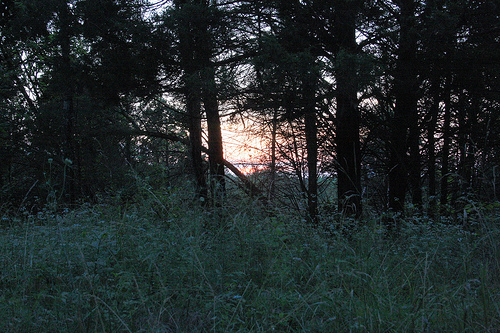
The setting sun meets land.
(*photo credit)
September 12, 2019 The Spirituality of a Non-Royalist
I inherited from my ancestry a religious piety but not a royalist one. However, when looking closely at homilies, prayers and other devotions I find a politically partisan flavor to some of the church activities down through the ages. We are quick to call Christ the "King" and Mary the "Queen" of heaven. This is acceptable, for I prefer transferring nobility away from blood lineage and privileged but imperfect families; such spiritual royal titles are acceptable even though of recent origin.
However, in an effort to instill patriotism and a mix of culturally-bound religious practice we find that numerous kings and queens accepted by Catholic, Orthodox or the Lutheran faiths are regarded as saints (Boris of Bulgaria, Cunegund, Edward, Eric of Sweden, Elizabeth of Portugal, Ethelbert, Hedwig of Poland, Helen (Ellen), Emperor Henry II, Louis IX of France, Margaret of Scotland, Olaf of Norway, Olga, Stephen of Hungary, Vladimir of Kiev, Wenceslaus, etc.). Some like Olaf were so cruel in methods that, if they made sainthood, just about anyone can make it. It disturbed me that monarchs stood out from the rank-and-file individuals whom we could elect for fixed terms in office and who are accountable through democratic mechanisms. Some kings killed and some queens were arrogant -- and yet noble ones are remembered when other lesser-titled saints are forgotten.
Far better is it to look upon the heavenly body as comprising many who were not well-known and yet were faithful to their callings; they influenced those in their immediate surroundings. Those of us who are non-royalist like to champion Jesus, descendant of David the king, as a person who never flaunted earthly royalty. Jesus told Pilate that he was a king, but that his kingdom was not of this world. We prefer to see kingship where the leader goes before us and does not so much sit above us. Jesus shows kingship by washing the feet of his disciples and expected them to do the same for others. Humble service as kingly is often dismissed. Subjugating Earth in an exploitative manner neglects a loving service of "power" and "lordship" that even environmentalists forget is the Christian way to act.
Our kingly service ought not to be in palaces, but in the hovels and slums of cities and the backwoods of our rural areas. Here we can still serve as leaders and change agents, but without the pomp and fanfare accorded nobility. Doesn't this have a deeper scriptural basis, especially since God did not want the chosen people to be ruled by a King; God yielded to their insistence to be like their neighbors? Nobility based on worldly and blood lines was not highly regarded in Scripture, just as our profit-motivation ought to be spiritually and not materially motivated.
Prayer: Lord, teach us to be direct in our prayers, to use words more in keeping with direct discourse today, and not to be subject to kowtowing. Help us rid our prayers of noble privilege and become more democratic in their manner of expression.
Catastrophe Versus Soft Sell
When using proven climate change data and prudent projections of future effects the current climate change process is awesome. How this information is used is critical to an understanding of the situation and the need to take proper action. Globally, people and especially the poor are experiencing more frequent weather extremes and their hottest summers; on TV they see examples of melting glaciers and Greenland ice sheets; they hear that ocean levels are gradually rising from melted water and this also affects coastal flooding; they are beginning to believe the near unanimous consensus of climate scientists that things are bound to get worse if immediate action to curb climate change is postponed. Uneasiness pervades the planet and touches our ordinary lives.
How do we respond to this growing mass of evidence in order to address the fence sitters? How do we inspire the concerned to undertake action? Often we find mixed audiences and so an emphasis on catastrophe perhaps affects some and frustrates others who need to have more positive reports. On the other hand, to speak of positive steps could fall on the deaf ears of the climate change deniers or belittlers. One possibility is to attempt to segregate the audiences and treat them differently; not always possible. Thus a catastrophe approach may have top billings in some media, at least until the media tires -- and that comes ever too quickly even amid the accelerating seriousness of the situation. Certainly, we must motivate fence sitters and challenge their complacency. And as for a pro-environmental choir these are expected to do more than sing. We all must work together collaboratively.
A catastrophic scenario can be raw truth and that is sometimes the most spiritual approach to the unconcerned; their own and their grandchildren's hides are at stake. To use climate scientific data without embellishment strikes a bell because it is clear -- but to preach damnation has its limits. Too much negative news can cause some to do one of three things: deny that such could be the case and thus listen instead to the dwindling merchants of doubt; excuse themselves when knowledgeable as not being experts, and thus leave the matter to other activists; or escape to a multitude of allurements being psychologically unable to handle the situation.
A positive approach of taking meaningful action is not as media-worthy as negativity, and yet can have greater overall effects when carefully presented. Most people prefer to be believers in the future and are repelled by those who see a catastrophe and then consider survival of themselves and their loved ones as a primary response. A positive approach appeals to the social nature of our problems and the need for collaboration by responsible citizens. Calling this "soft sell" could be misleading, due to the seriousness of the problem. The positive approach is through continued education and reasonable and practical actions of such a variety that all can contribute in some way.
An emphasis on the positive approach with some mention of catastrophic underlying causes can be used by political, civic, religious and educational circles; it enhances enthusiasm by those who are somewhat burdened by foreboding possibilities. While precious time remains, this is a call for agents of change to be acknowledged and encouraged to lead the way to radical change in our economic system. Cooperative environmental actions exist and invite acceptance: curbing resource waste, instituting renewable energy substitutes for all forms of fossil fuel application, changing lifestyle to use less resources, and implementing reclamation projects for a damaged world (e.g., reforestation programs in the Amazon).
The catastrophe may actually prove worse than anticipated today. The slow pace of curbing climate change following the 2015 Paris Climate Change Accord could result in more serious impending disasters: Asian water shortages, Pacific and Indian Ocean island nation inundation, extreme heat in Europe, more wild fires in the American West, and expanding deserts in central Africa. In all prudence, the situation could be judged as dire and even worsening should human collaboration be postponed or delayed. Accelerated catastrophic rhetoric must confront the remaining well-paid merchants of doubt who are extending the fossil fuel economy for as long as possible -- to wring out greater profits for the superrich.
A combination of negative and positive news is always a challenge as to type of audience present, degree of emphasis, and the manner in which the presentation is made. Hopefully, possible collaboration is not deadening as is the drum beat of catastrophe. The truth is the act of collaboration could promise great things for improving the situation of the world's poor and hungry. Rather than a dire 2050, if we act boldly we can bring about ever greater non-military-based security to our threatened planet. Rather than curb the negative only, collaborative process ahead could lead to greater promise.
A spiritual insight is needed. An alternative positive approach is to see the situation as a golden opportunity to change our outlook on the planet itself -- but this is a spiritual undertaking and requires more than mere secular cooperation. Will the believers in the future rise to the occasion and seek divine assistance?
Collaboration on a global scale has never before been contemplated on so important an issue. Willingness requires inspiration and insight on the part of agents of change. If and only if we succeed then the Kingdom is truly coming, as mentioned in the Lord's Prayer -- a kingdom of justice and peace. This invitation to participate when facing a catastrophe demands courage and forbearance. With God's grace we can rise to the occasion and bring about global benefits to all people and Earth herself. Much depends on our willingness to act at this moment. The role of negativity and positive approaches hangs in a balance. With trust in God we can succeed.
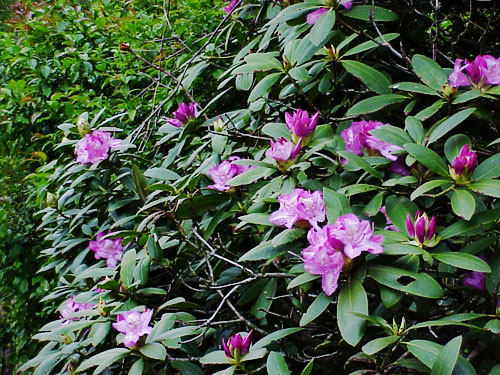
Rhododendron, thriving in acid soil of the Appalachian Region
of Kentucky.
(Photo by Sally Ramsdell)
September 13, 2019 Endangered Languages: Alsatian and Others
When implements we used in youth are now found in museums (e.g., corn shellers and scythes), we know we are aging; when the language used by our grandparents -- and father in youth -- is endangered, we feel even a little older. Alsatian (still spoken by folks in Alsace in northeastern France) is so designated as endangered. It is a dialect of High German (Elsassisch) and known as Alemannic in scientific circles (German spiced with French). Actually there are several varieties of that dialect spoken in parts of the region by a diminishing number of residents. My late first-cousin-once-removed's children and grandchildren speak French, but her own language of primary communication was Alsatian.
At the start of the Second World War our relatives were evacuated to central France, the largest population movement in modern French history. Once these folks arrived at their temporary residence, locals called them "Borsche" (German) though they were really French citizens. They were forced to cluster together; after the French government surrender, they were able to return to their homes; back now in occupied territory, they had to purge themselves of any French habit, even the wearing of the beret. After the war, which had taken such a tragic toll on that neighborhood, everything became French again. However, today the border between the two countries (France and Germany) has been erased, and you hardly know you cross from one to the other.
Dialects have a hard time even when Alsatian wines are well known. One sees few Alsatian signs, no major newspapers, and no notation on gravestones in Alsatian. However, famous Alsatian dishes such as Flammenkuche, tarte flambee and Grande Choucroute are current delights. Youth learn French in schools and reserve the dialect for conversation with family elders. The patterned road to extinction is laid in Internet interaction, university life and coffee shop conversations; this is similar to what is happening in Pacific Isles, among Native Americans, and in many parts of Africa. Europe is not immune and my grandparents' tongue is one.
On January 21, 2008, Marie Smith, the last speaker of the Eyak language in Alaska, died; a last-of-a-language death occurs about two or three times a month. The UN reports that at current rates within this century half of the 7,000 languages of the world will vanish -- three per month. Native speakers die and their offspring prefer major languages. National Geographic, "A World Loses Its Tongues" (Oct., 2007) has a map showing the most threatened areas. The Living Tongues Institute for Endangered Languages, a National Geographic project, ought to be supported. The Basques resist the threat, but others do not. Conservationists are alarmed by threats to plants and animals; why not world's languages -- and dialects? Let's promote threatened languages in schools, install dual language signs, and support annual cultural festivities?
Prayer: Lord, help us to champion endangered species, especially when they are our ancestors’ cultural treasures.

Enjoy a lovely spray of snowball bush flowers.
(*photo
by Sally Ramsdell)
September 14, 2019 Gratitude for September Gifts
As the weather becomes a little milder and the autumn is approaching, those who suffered through a hot summer are beginning to discover new subjects to be thankful for:
* Living through the summer and coming out with a pleasant disposition and good memories of the preceding three months;
* Fruits and vegetables of summer in all their richness, including peaches, corn, beans, plums, berries, okra, new potatoes, beets, carrots, tomatoes in all sizes, squash, and cucumbers together with the first autumn apples during this month;
* Cool mornings and the heavy dew and occasional heavy mist in the valleys;
* Gatherings of people in our worshipping communities and the concern these have for the ill and abandoned folks, especially when frost and chill are soon approaching;
* Festive occasions in the fairs and festivals of late summer and autumn and the desire of people to socialize together in more light-hearted ways;
* Those with special musical and artistic talents who have inspired us and go somewhat unnoticed;
* Parents and forebears who have gone on before us and yet who have inspired us by their concern for us and others;
* Conserving folks who want to continue the good of the past and to conserve resources of every sort (finances, energy, soil, and human good will);
* Soybean and corn fields now turning golden and the hopes that the products will be used only for the benefit of all people;
* Academic institutions and the teachers who show such enthusiasm and desire for the transmission of knowledge to a new generation of eager learners;
* Hope that a catastrophe caused by climate change can be averted and a renewable energy economy created;
* Libraries and receptacles of knowledge of every form including the Internet, with expectations that the means of preservation will be sufficient to allow knowledge to be transferred with ease to future generations; and
* Fall rains that are so needed to assist the frail autumn plantings and the cover crops sown for winter protection.
Prayer: Thank God for September from all of September-born.

The setting sun meets land.
(*photo credit)
September 15, 2019 Prodigal Son and Forgiving Father
The Prodigal Son Parable (Luke, Chapter 15) is grouped with the parables of the lost sheep and the lost coin. Care is needed in the regaining of each lost animal or person. God is a caring shepherd when going to find the one lost sheep and leading the rejoicing in the heavenly court over its return. Often we too need to seek and to reach out freely and joyfully when bringing back others to proper living. So too, God is a diligent housekeeper (a female figure) when searching the house for the lost treasure. God is always caring for us.
Prodigal son. Forgiveness is at the heart of the parable of the Prodigal Son -- or Forgiving Father -- or Unforgiving Brother. Where do we fit into the picture? We all are partly Prodigal children, for we are wayward in our actions and practices, not being perfect people. Time flies, and we find that we have allowed our life to pass before us in a wink. In some ways, all of us are prodigal children of our Father in heaven.
Forgiving father. Perhaps the father figure in the Parable is difficult to imitate because it is so hard to be godly, and forgiveness is to imitate God in treating others. If we do not forgive, we can hardly be forgiven, and so forgiveness is a prime mandate of those committed to the road to perfection. The forgiving father looks out each day and finally spots the son from a long way off. He has so longed for the son's return. Recall that the prodigal son has memorized a verse, but the father does not allow him to complete it because forgiveness has already come before the son speaks. God's mercy is always at work from the first moment.
Unforgiving brother. There is also the element within us that does not want to forgive others, especially those who have such clear faults that all are aware. Why forgive, when the other sibling caused the brother harm in squandering half of the possessions? We may see close relatives or friends lose precious opportunities; we find it hard to forgive them, especially after they hurt us in some way.
Often we are tempted to favor the unforgiving brother. The father cannot dissuade him from his own festering anger. The brother does not feel like celebrating, especially after all the hard work he has expended. Why all the toil, if the other son is forgiven for doing wrong things? But the unforgiving one fails in generosity and in sharing in celebration with his grieving father. However, God gives all to us, and none of us is worthy -- not just those we term "prodigal." To fail to forgive is to fail to love, and thus the isolated retreat into self-pity. It's frightening.
Prayer: Lord, help us to be free agents who bring back to life all in need of forgiveness. Help us reflect on the phrase, "He who is as good as dead has come back to life." Help us to forgive, to give new life, and to reestablish fresh bonds of love.

Leaves and developing berries of the poke plant,
an edible Kentucky favorite.
(*photo credit)
September 16, 2019 Pokeweed Revisited
Since the time we talked about this subject on May 10, 2014 we have helped to popularize American "poke" or "pokeweed" plant (Phytolacca americana). As of this writing we have had over 100,000 viewers on our YouTube video "The Many Uses of Pokeweed". The public welcomes a positive approach to this highly versatile plant, which grows so easily in our area and is also beautiful. A few years back, a Filipino visitor to our nature center was more impressed by the natural splendor of our volunteer pokeweed plants than any other of our exhibits. Maybe we Americans should treasure this beauty as well, especially since pokeweed can easily endure dry summers with no watering. Certainly, it proves hearty as well as pretty, for pokeweed is one of nature's hidden treasures:
* Poke is delicious; it is the main ingredient in Appalachian "sallat," a welcome springtime dish; the tender shoots can be prepared like asparagus sprouts; they fool the uninitiated as to comparative texture and flavor to the finicky asparagus plant.
* Poke is easy to grow for it keeps coming back year after year, and takes little or no cultivation, pesticides or herbicides. It is a most hearty plant though it likes composted soil best.
* Poke continues a late spring dish. Skin off the thin red outer cover discard two boiling water soaking and rinse and cook the stalks to soften and remove bitterness; the leaves are also nutritious when prepared like spinach. I use both leaves and sprouts well into summer, though early tender ones are best.
* Poke berries have many uses. The beautiful dark red berries come in clusters in midsummer and have been used for dyes by older mountain folks. Some have made a red ink with berry juice. These berries are also herbal remedies for aches and pains. Older mountain people fed the berries to ailing livestock. One older Appalachian herbalist recommended that the berries (it only takes about a dozen clusters for a year's supply) be frozen and one berry swallowed whole each day. I find that arthritis problems do not haunt me as to some of my other family members. Remember to swallow the berry whole and not chew the seed, though I hear about people who gobble down berries in large amounts and have never gotten sick. Is it because poke berries are free, not high-priced commercial pills? I harvest poke berries and put them in the deep freeze and swallow one frozen berry or dried berry each day to prevent arthritis/rheumatism.
Poke's bad reputation may be because some are allergic to pokeweed, just as some to peanuts or have lactose intolerance. Yes, the roots are truly poisonous (just as are non-fruity parts of the tomato). Don't be afraid; use caution until sure of use.
Prayer: Lord, give us the grace to promote your gifts that are more easily misunderstood for the benefit of all.

Sweet joe pye weed, Eupatoriadelphus purpureus.
(*photo credit)
September 17, 2019 Six Arenas to Exercise our Citizenship
Citizenship Day is when we review our efforts at being good citizens, such as voting and being involved in local or national political issues. Opportunity to express ourselves exists every year, for exercise of citizenship has a social, economic, cultural, and human-caring flavor always in season.
* Youth Initiatives. "Are You Ready To Take It Back?" Others say "Make School Safe." These signs have been posted in their various forms in many local school districts along with youthful enthusiasm about gun control and tackling the opioid epidemic. The messages refer to taking back the schools from the drug culture or the NRA groups. Initiatives come from students with the sincere desire to express their right to citizenship and its roots. Take back the schools!
* Farmers' Markets. We have had a proliferation of small- scale initiatives to sell home-grown items that have blossomed in the area along with yard sales. Actually, such sales keep money within the community; otherwise customers will patronize the national chain stores that drain community resources by selling low-cost and short-lived, often foreign-grown products -- and many laced with chemicals. Take back our marketplaces!
* Backyard Gardening. Produce, and don't just buy food from a market. Spare land may exist on which to garden, and most people could have at least a few pots of herbs or tomatoes during the growing year and beyond. Take back our food sources!
* Historic Highlights. Every place has a history and it ought to be one of which we are proud. Kentucky and other states place markers at selected historic sites with proper explanations. Why not have more of them? Residents will develop a deeper pride when they become familiar with local history and are able to tell it to others. Take back our local history!
* Employment Opportunities. All parts of our country are in need of community infrastructure improvement and repair. Allowing other places to receive the attention sounds nice and deferential, but overlooks the fact that every part of our country has such needs. Our military budget could be trimmed and the surplus funds need to be returned to communities for building and improving our infrastructure (bridges, clinics, schools, housing, streets, parks, rest facilities, lighting, etc.). Take back "the right to work"!
* Visitations. We are all one community, but all too often some people are forgotten. Moving about the community and discovering who the elderly and ill are takes an extra effort. How often, after an initial alert, the home-bound recede into the mists of our busy world. Take on local works of mercy!
Prayer: Lord, help us to be alert to our responsibilities and what it requires to be good citizens.

Late afternoon stroll by water's edge. Mercer Co., KY.
(*photo credit)
September 18, 2019 World Water Monitoring Day: Urgent Times
With each passing year the water resources of the world become a topic of greater urgency due to increased population and need for fresh water, shrinking water aquifers, and melting fresh water ice reserves in polar and glacier regions. We have much water but a limited supply of accessible fresh water, for 97.5% of the Earth's water that covers four-fifths of the planet's surface is too salty to drink. Of that 2.5% that is fresh water, some 69.5% is tied up in ice caps, glaciers and permafrost, 30.1% is in groundwater and 0.4% is in surface and atmospheric water.
Of this last 0.4%, some 67.4% is in lakes, 12.2% in soil moisture, 9.5% in the atmosphere, 8.5% in wetlands, 1.6% in rivers and 0.8% in vegetation. This "usable" water is a critically small portion of the planet's total self-contained, limited water supply -- and thus we need to enforce regulations for preserving this precious and limited fresh water resource by conservation measures.
Agricultural water use (67% of total fresh water) can be greatly reduced by better irrigation and water transport (lined water conduits) and ultimate utilization (e.g., drip irrigation and use of mulch). Many of the heavier industrial and domestic users (20%) and power generators (10%) are taking conservation steps in production of goods and electricity. While domestic water conservation measures are important in times of water scarcity, we all ought to become conservation-conscious and engage in water saving practices (e.g., shorter showers and low-flow faucets).
Available instruments allow us to measure water waste in various areas of the "water consumption" process (not available for reuse). Greater rates or fines can be imposed for water waste once use is monitored. Evaporation from fresh water sources can be reduced by the use of evapotranspiration computer techniques; leaking pipes and storage containers can be detected and fixed; dripping faucets are able to be repaired; the watering of plants can be done during cooler periods of the day; and lawns can be planted in arid-types of vegetation or golf courses by vegetation that thrives on saline water sources. Many innovative ideas that allow for conservation of water exist and need to be publicized.
Monitoring will be necessary in the future when rising urban populations reach water crises especially during times of climate change. Such water-short, mega-metropolitan areas as Capetown, New Delhi and Mexico City already strain to redistribute limited water to the very needy. Limited amounts of available fresh water are at stake. Desalination of plentiful lower quality water (see September 21st) is possible, but distilling salt water, as performed in oil-rich and water-poor Persian emirates, is grossly expensive. Low-priced solar desalination methods await future technical breakthroughs.
Prayer: Lord, teach us that the human right to water can be aided by supporting strict monitoring of current water users.

Pawpaws (Asimina triloba) in Kentucky.
(*photo credit)
September 19, 2019 Do Wild Foods Taste Better?
Early in life I discovered that things you scavenge in the field or forest always taste more inviting. That habit never left me. When I was in Israel, the guide came up and said, "I saw you tasting plants in Judea, but here in the Negeb remember that every green thing is poisonous." In early spring grasses and leaves had those distinct tastes that made each interesting. Over the years, I have graduated to more herbal greens (dandelions, plantain, chickweed, lambs quarters, wild garlic, etc.). The taste of the wild remains in many ways, for when I enter a new territory I like to taste its produce. Somehow, wild flora always seems enticing.
To harvest wildlife would demand hunting and this sport never appealed to me. The rare exception was our war on crows that pillaged our corn fields; these villains would fly onto corn stalks and rip open ear after ear of fresh milky corn and then move to another, leaving a path of destruction. However, wild young fried crow did prove tasty when once tried. In my youth we did not experience the current hordes of wild turkeys, geese and deer now frequenting our rural areas and feasting where they wish. We would have extended hunting to them as well, and have avoided innocent rabbit, dove and squirrel in which I found absolutely no sporting fun at all. Yes, I am not patient enough to fish or clean catfish.
Wild plants did not require the tender, loving care afforded to garden or orchard cultivars; they endure harsh weather conditions fairly well. Early on we learned never to eat any white berries and that proved to be a good rule of thumb. We stayed away from "leaves of three" for fear of poisoning, and we carried a big stick during berry-picking to battle copperhead snakes. We avoided mushrooms except the recognized morels, even while this county has an annual "Mushroom Festival" and I am in the process of learning a variety of good wild mushrooms. Smooth pink lemonade made from sumac clusters is great as is the taste of sassafras root and lemon grass. I gather poke during various seasons (see September 16).
My current wild gatherings also include persimmons, papaws, wild plums (my utter favorite), wild cherries, wild grapes, mulberries of various sorts, walnuts, hickory nuts, hazelnuts, blackberries, raspberries, elderberries, strawberries, dew berries, blueberries, and "wine berries." The last named is an exotic supposedly introduced to America by Thomas Jefferson. The Natural Bridge State Park folks in my parish bounds regard wine berries as invasive and have wiped out my favorite berry patch.
We are always on the lookout for new foods and new tastes in virtually every season of the year. We once had a volunteer who was just as enthusiastic, but came in one day all broken out with a rash. I asked what did he eat and he said a great number of things. Yes, wild things taste different and even better. But like all things, treat the "wild" with care and respect.
Prayer: Lord, teach us to honor and respect all good things.
Degrees of Environmental Action
People act in different ways depending on their own personality, energy level, environmental situation, mental state, and on their domestic lifestyle. The following are possible ways of acting to help bring about a new economic system with a focus on renewable energy in place of fossil fuel. These are listed by degree of intensity, not of importance, for what is most effective is that all types of action work in unison for a more effective renewable energy future.
Confrontational action is necessary and must never be omitted as a viable way to change -- lest the situation not be regarded as imperative. This confrontation can take immense energy at a specific time and can elicit violent reaction from the status quo. Powerful forces of reaction can frighten the timid and demand courage from the strong, for open countermeasures can be risky. For instance, those engaged in halting a fossil fuel pipeline or terminal may seek to curb fossil fuel development, but Big Energy will do all in its power to confront demonstrations and countersue environmental groups.
Political action involves what is expected of energetic normal citizens who must do their duty during threatening times. This means participating in political party activities, signing petitions, making phone calls and emails to legislators at times of critical legislative action, writing letters-to-the-editor of prominent newspapers, attending and participating in rallies, voting in primaries and general elections and encouraging others to do the same, and supporting good candidates for political office through actual canvassing and taking neighbors to vote. In a democratic society the opportunities for such political actions are enormous, and greater participation is worth fostering.
Social media activities are not to be omitted even as more remote causes for action. If time and energy permits interaction about climate change and its ramifications with relatives, friends and neighbors is needed; individual citizens can make a difference through Facebook, Twitter, Instagram, YouTube or personal interaction on the internet and phone. Conversations about the seriousness of the situation are a major way of bringing about change in attitudes, far better than social banter.
Individual ecological activities include all the steps that are mentioned in the Green New Deal Appendix: conserving on heating and cooling applications, driving with care, eating less meat, curbing processed and non-seasonal foods, vacationing closer to home, recycling and using electronic devices sparingly. Individual actions make us aware of the need for our part in bringing about change; they make us more observant of waste in our midst and how we ought to respond; they afford opportunities for us to encourage others to such practices as cleaning up the local environment and conserving on land, air and water resources.
Local community action may be the most meaningful thing some people can do to bring about greening our environment, for at this level change is more easily perceived. Again, all actions are important, but some people find interactions locally as a difficult undertaking; they prefer to act alone or give general (often monetary) support to regional or national causes. However, a local green community can have powerful effects as exemplars to neighboring localities, and thus begin a concatenation of similar activities -- "a ripple effect." Furthermore, quite a few people do not find it easy to make individual changes without social assistance, and a community operation will give them additional needed support. For them, this is an important activity.
Religious activities in the form of public worship services should never be overlooked, even in times of declining church attendance. We should never forget the role of the churches during the first American Revolution in the 1770s; at that time church attendance was far lower (about ten percent at most of the general population), and yet sermons and prayerful invocations were instrumental in changing attitudes throughout the colonies. For one thing, religious services bring people together, many of whom are not active in other social and political media. Furthermore, the moral obligation to seek divine assistance becomes a stated public goal and undertaking; the public act with others encourages private spiritual practice as well.
Personal prayer is more than a mere whisper to the Almighty at daybreak or dust; when meaningfully undertaken this moves us to seek divine assistance that is critically needed at this time. Prayer changes our personal attitudes whether in a formal or informal manner, but it takes energy and is an action, especially suited for invalids, elderly and shut-ins who have little energy to do any of the above activities. However, this is not exclusively for these who are home-bound; all citizens of whatever energy level ought to combine public religious and private devotional activity as part of their lives. It's good for us all. Our daily meditations and moments of reflection are part of a grand transition with the immense opportunities to bring forth a New Heaven and New Earth.
Compassion as activity is not easily recognized and is a Christian undertaking but with similar echoes within other religious traditions. To offer in compassion sufferings with others both helps the assistant and the sufferers themselves. A deeper communion occurs that reaches out in a spiritual manner to the entire suffering world. A real spiritual dynamic is at work, though denied by an aggressive secular world, which seeks to terminate life of the sufferer. While still trying to alleviate suffering, we can acknowledge the reality that all, even Earth herself, suffers through human misdeeds. By entering into the global suffering event we form an intense community that furnishes a global will power for needed changes. Through compassion we discover healing and advance a new beginning for all.

Ironweed (Vernonia altissima) with lovely visitor.
(*photo by Sally Ramsdell)
September 20, 2019 Call for a Nuclear-Free Middle East
We hear much about the Middle East because the key to world peace is focused there. Besides the ongoing Syrian conflict, the festering Palestine problem seems to have no solution; Iran captures the news on an almost-daily basis; we have been engaged in and are only partly disengaged from two wars in Iraq and Afghanistan. Arab nations have called for a nuclear-free Middle East region (just as there are declarations of a nuclear-free Africa and nuclear-free Latin America). Certainly we all want a nuclear-free world and must work to achieve it region-by-region until all nuclear weapons have been eliminated.
Since at least 1968 a nuclear-free world has been a long-term goal, especially through the Nuclear Nonproliferation Treaty (NPT), which limits weapons to Russia, United States, United Kingdom, France and China. However, other nations such as India and Pakistan have obtained weapons without accepting the treaty. Furthermore, Israel has such weapons but is not an NPT member and refuses to participate. Recently Korea has been in the process of becoming nuclear-free -- at least we hope and try to verify.
With respect to Middle East policy it is hypocritical to focus attention solely on Iran, which has acquiring enriched uranium for its peacetime programs (despite the long-term risks of nuclear powerplants). The unspoken discussion point in the Middle East is the supposed hidden atomic arsenal of Israel. International concern must work two ways, not all directed against Iran alone. Why has the United States, a broker of Middle East peace efforts, refused to address this most hidden and most known of secrets, namely that one nation of that region already has such weapons? Unless this problem is faced, there's no lasting peace.
The current Administration seeks to talk about a comprehensive Middle East peace initiative that includes lifting the Gaza blockade and stopping the expansion of Jewish settlements in the West Bank areas. Nuclear weapons retention is well worth including as one of the essential issues for, unless it is raised, certain other Middle East nations will strive to counterbalance the superiority of Israel in the region.
Yes, let's make a nuclear-free Middle East a goal for peace and require inspections and verification of the weapons of ALL nations and not just those of the NPT members. Amazingly, this even-handed approach would go a long way to bringing about a peace settlement that has been so long postponed, delayed and reneged upon. The United Nations ought to be the guarantor of the security of that region, not one or other nation state arming itself in a "never again" attitude, which is only making the world more insecure. Nuclear weapons presence makes the Middle East an insecure place to live. Come clean, Israel! How else peace?
Prayer: Lord, help us have the courage to require international honesty and transparency as a step to world peace.
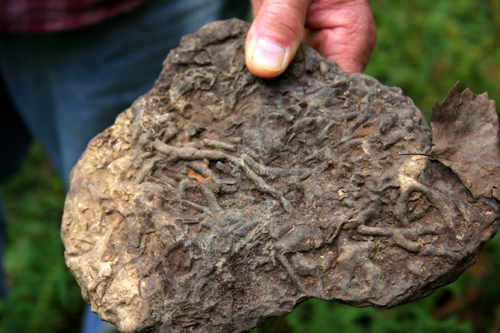
An assortment of bryozoan fossils.
(*photo credit)
September 21, 2019 Desalination: A Technological Frontier
Increased world population, rapid urbanization in developing regions, growth of the global slum population to nearly one billion in this decade, and limited and costly water supplies make affordable and available clean water a major global problem. If 97.5% of the planet's water is undrinkable, could not the free solar energy be used to desalinate saltwater -- a great technical frontier? An estimated 300 million people get their water from sea or brackish groundwater treatment methods today, double the amount of water in one decade; more than 13 billion gallons per day are now available in this decade through desalination projects. No doubt, conversion of undrinkable to drinkable water is the 21st-century water/heat transfer engineering undertaking.
Distilling water using conventional energy sources is costly even though it is used in small projects and in water-short, petroleum-rich Middle East countries to enhance water supplies. This longstanding practice is environmentally and economically wasteful, and the distilling residue (salt) remains as a disposal problem. When inlets and bays furnish the water for desalination, over time the residue of the operation will make surrounding water, such as shallow portions of the Persian Gulf, saltier; and so purification costs will creep up. Reverse Osmosis (used in Tampa, Florida, and Perth, Australia) is expensive, but less so than distillation; the process involves applying pressure (one thousand pounds per square inch) that leaves salt behind in transferring water through special membranes. Forward Osmosis sends water through a porous membrane into a more salty solution wherein the special salt is more easily removed than common sodium chloride. Other newer techniques include Carbon Nanotubes that repel positively charged sodium ions and allow water to pass through the tubes. A Biometrics approach allows water to pass through a protein channel similar to what happens in the human body; the salty brine remains. All of these methods are costly on a major scale, and residues remain for disposal.
Solar distillation awaits new breakthroughs, but many realize the potential for application in a thirsty-but-poor world. One solar desalination technique is the multiple-effect humidification that is similar to the natural water recycling process except at a more rapid rate. Solar heat vaporizes liquid water that is then condensed and the heat given off can be used to preheat the incoming salty water. Small-scale operations are possible because the heat given off is regarded as "waste heat." In larger operations, the unsolved challenge is the cost of achieving optimum temperature difference between the solar-caused vaporization and the seawater-cooled condenser. As some of these heat transfer problems are solved economically, one can expect solar stills to be considered by water-short urban areas, especially where available brackish water sources exist nearby.
Prayer: God, give us the courage and ingenuity to tackle the water shortages that are besetting our limited world.

Forest floor color in September.
(*photo credit)
September 22, 2019 Resourcefulness and Stewardship
No servant can serve two masters. (Luke 16:13)
Citizens must do more than vote every two or four years. They must remain alert to legislative happenings and be willing to contribute support or opposition to initiatives throughout the years. Are those we entrust with government able to act justly? Do they understand the limited condition of physical resources available in our country, state or local community? Do they understand that one serves God in fulfilling civic duties and these duties have social, political and economic consequences?
In the eighth chapter of Amos the Prophet, we are reminded that we are not to trample upon the needy. But trampling is so often done by those with heavy military or exploiter boots or those with hiking or lobbying shoes. We can make heavy footprints as individuals or as groups. We tend to take advantage of the poor when we buy materials made in sweat shops overseas, when we allow industries to move abroad, to escape responsibilities to long-time, loyal workers; and when we minimize the services of the minimum-wage earners. What about egregious examples, e.g., the deporting of hard-working illegal workers; the day laborers without a written contract who work a month and are dismissed without pay; the Native American groups who lose priceless sacred objects to grave and artifact stealers; and the people who live downstream from unsafe chemical processing plants or coal slurry impoundments?
In St. Luke's Gospel we are told we must be as resourceful as those who are the clever but evil-spirited stewards of the Earth's resources. You mean bad guys have good qualities worth imitating? In this vivid parable Jesus says the answer is "yes." We can learn from resourceful profiteers. Good stewardship must have such basic ingredients as realizing that our gifts are from God, and we have only a short time to use them properly. These characteristics help make us all the more resourceful. Those who have yard sales for recycling clothes and domestic items know how to use resources well; those who teach youth or care for the sick learn how to keep people interested and cheerful; those who have little, know how to squeak by on less and share with the still more needy.
We realize that our God-given gifts are ours for only a brief period. Do we recognize these for what they are, and learn from resourceful people how to use gifts in ingenious ways? Should we intensify our search to convert from a fossil fuel to a renewable energy economy? Should we support those who wish to defend religious liberty? Are we on the lookout for new ways to get our message across in the social media? Do we take time to evaluate how well we as individuals and as communities use our God-given gifts? Do we see our works as prayers, and offer them each day to God as part of our resourceful use of time?
Prayer: Lord, help us to become ever more resourceful and to learn from others who do such things well.

Leaves of the sweetgum, Liquidambar styraciflua.
(*photo credit)
September 23, 2019 Practical and Theoretical Environmental Issues
Some folks like to be practical in all matter and some tend to be theoretical without expressing it and expecting others to make the practical applications to their insights or research. I hark back to the thought and practice of my famous chemist/mentor, Michael Dewar, at the University of Texas in Austin. Professor Dewar held that one MUST balance the practical and theoretical; if we do not, we shortchange the world in which we live. The overly practical neglects long-range ramifications, and the overly theoretical fails to appreciate what the work-a-day world knows happens in the gray zones of hands-on experience.
Let's consider this balance in healing our wounded Earth. When we focus on doing certain things well in a practical, detailed manner, we may lose sight of the bigger picture of a hoped-for New Heaven and New Earth. The overly practical ask, "Why be such pie-in-the-sky dreamers?" On the other hand, all too often long-range goals do not take into consideration the inherent weaknesses and barriers of practical details. Some wishful theoreticians may ask, “Why can't the poor take matters into their own hands?" In both questions there is a distance that is caused by lack of balance and betrays an absence of cooperative endeavor -- a sharing among parties in the vital work of earthhealing. It is as though practical health attendants were operating separately from physicians. Success requires balanced cooperative endeavors.
Theory calls for such working together in order to make a better world -- but it demands that theoreticians respect, listen to and gather in practical information in order to come to workable ways of reaching sought-after goals; it also requires understanding that the practical bears equal weight to what is known in theory. Practical people are often shocked when they are ignored and dismissed; they see like-minded members simply give up and quit. What has been missing is the dynamics of the future pulling us and energizing us to continue operating. We can do it; we must do it; but we cannot do it alone. We need both theory and practice with neither overwhelming nor ignoring the other.
We justify the balance of practical and theoretical reflections because both are essential -- a lesson from Michael Dewar delighted in discussing the practical AND the theoretical. Among this month's Daily Reflections we include cooking with elderberries, many uses of pokeweed and drawing up checklists; we touch on the need to halt over-consumption, to remove tax havens and to consider both theory and practice. Some essays lean to one or other approach; others are a mix depending on modes, issues and seasons. Our Earth needs practical and theoretical folks talking to and working with each other. We Christians demand the balance because Jesus is God-man, and our liturgical practice includes matter (bread, water, etc.) and a God who is spirit and truth.
Prayers: Lord, keep us enthusiastic about what is happening in a practical way today and how it impinges on our future goals.
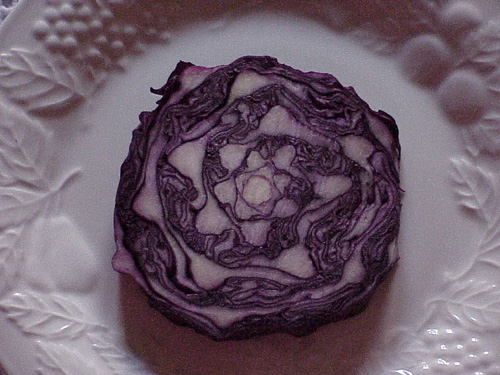
Red cabbage, nature's work of art
(* photo by Sally Ramsdell)
September 24, 2019 Visiting Old Friends Retirement Facility
Most people want to be kind to horses, for they are loveable animals. Yes, as a Kentuckian I have a bias in thinking that everyone loves horses, and especially racing thoroughbreds. Our Commonwealth is obviously proud of this distinction that Lexington and its surroundings comprise the "horse capital of the world." Immediately to the northeast of Lexington near Georgetown is the non-profit Our Friends Thoroughbred Retirement Facility with currently about 175 retired horses, a number of whom have been moneymakers in the racing industry and are well known names. All resources are now being employed to attract tourists and make this a viable service that can truly bring enjoyment to those who come and see and feed and pet the retired horses.
As one who does not believe in retirement it is hard to champion for horses what I dislike for humans. However, the Old Friends facility offers the horses more than plentiful pasture. They have a chance to be observed and photographed as well as give genuine enjoyment to visitors who are animal lovers -- not necessarily gamblers. Horses seem to sense that these people are starved for physical contact with animals and plants. Recall that current commercial thoroughbred farms are off-limits for tourists because their horses are valuable assets to be handled by experts and hired service people. Please keep away from those white fenced estates! Such pressures are not present at Our Friends.
The facility was started by former Boston Globe critic Michael Blowen and this has become a living history museum of horse racing. Currently it attracts over 20,000 paid visitors each year to see Derby and Breeders' Cup winners and seconds (who made many starts but no crowns) and such winners as Alphabet Soup and Silver Charm -- the greatest money-making horse of all times. Volunteers conduct the tours and are happy to tell stories of the various horses. No matter what the history it is a far more humane way of treating animals. Two additional facilities have now been set up: Cabin Creek in Greenfield Center, NY and Old Friends at Kentucky Downs in Franklin, KY. The motivation for these establishments inspires small-time landowners to take aging animals to live out their final years in peace and security.
Tourist travel for enjoyment is justifiable, especially if coming short distances or infrequently for the traveler's wellbeing. Tourism has many benefits (recreation, ease of tension, sociability, education, fulfillment of life's dreams, etc.). Everyone needs once-in-a-lifetime pilgrimages to shrines or places of origin. How about touring facilities that care for animals?. Ironically, carbon footprints are heavy due to replacement of the horse age by motor vehicles and the petroleum product-fueled internal combustion engine, e.g., home-grown hay as feed is replaced by fossil fuel. Horses remain long time friends.
Prayer: Lord, help us enhance our love of animals by treating racing and other retirees with a deep sense of respect and care.

Turtlehead, Chelone glabra.
(*photo by Sally Ramsdell)
September 25, 2019 Natural Gas Use Does Not Curb Climate Change
When it comes to climate change, I find myself like many others, vacillating between an apocalyptic feeling and a pretended optimism, saying "Yes, we can!" The 2015 Paris Climate Change Accord has been signed by virtually every nation, but the current U.S. Administration is distancing itself from it; the Accord is to keep climate change below an additional 2 degrees Celsius (C) since the time of the industrial revolution. Some climate experts are still pessimistic whether the needed goal can be sustained.
Climate change deniers or minimalists taut the increased use of natural gas in heating and electricity generation and call it a "clean fuel." However, many of us regard this as a myth that Big Energy profiteers used to help extend the life of the fossil fuel economy. In fact, the U.S. opened facilities just two decades ago to bring liquefied natural gas (LNG) into our country; thanks to recent "fracking" technologies the U.S. is now exporting LNG to other fuel hungry nations and is adding 7 other LNG exporting facilities. These expanding natural gas supplies are regarded as cleaner than coal and dirty tar sands petroleum. But the critical question is whether that is true. It's hard to determine because of lack of leakage data. Unfortunately, natural gases' main ingredient is "methane," which is 23 times more potent in inducing climate change than is carbon dioxide, the principal emission from burning all fossil fuels.
Natural gas escapes into the atmosphere but the mystery is how much, in current practices of drilling, transporting, processing and using. A new study last year found that the U.S. oil and gas industry emits 1.3 million metric tons of methane from its domestic operation each year. Large amount? Yes, it is 60% greater than currently estimated by the U.S. Environmental Protection Agency. It is all in the "leak rate" and this new quantity is 2.3% or far greater than the EPA original estimate of 1.4%. The differences seem small but they are enough to fuel 10 million homes and add to the global climate change rate due to enhanced methane greenhouse potential. What is equally tragic is that experts estimate that 75% of the leaked gas could be conserved and with two-thirds of that amount achieved at zero net cost.
Natural gas is certainly abundant both in this country and throughout the world -- but is utilized at great climate costs. At such recent low prices due to production methods, it directly competes with safe and environmentally benign renewable energy sources. All the while, expert climate scientists give a 50% chance global warming will exceed 3 degrees C by 2100. Some scenarios show an astronomical 4 or higher degree increase -- a total global disaster. The alarm is not in what will happen in the year 2100, but what COULD happen if we do not change quickly. Who wants to be boating over Florida or New York City or Bangladesh?
Prayer: Lord, teach us to confront the Big Energy profiteers and know the harmful effects of using fossil fuels at this time.

Autumn sneezeweed (Helenium autumnale).
(*photo credit)
September 26, 2019 Global Sanitation Problems and Solutions
Poor sanitation unfortunately persists; while nations like India and parts of Africa focus efforts in this decade on halting outdoor daily bowel movement, still almost a half billion people continue those practices. Customs such as ordinary daily practices are often very difficult to change even though heroic efforts. Some remain pessimistic that critical changes can be made by goal set for 2025 of the elimination of such practices. Part of the slow pace is that by United Nations estimates only 42% of funds allocated for sanitation and safe drinking water are reaching the problem area. Throwing a little concrete around a waterwell does not improve water quality -- though it's called an "improvement."
Severe water quantity and quality problems face the congested mega-urban centers in Asia, Africa and Latin America, swollen with millions of people from rural areas. When waste materials accruing from these increasing populations are removed by sewage systems through flushing with scarce water, the upkeep of dual water/ sewage systems becomes all the more problematic. Many developing nations are short enough of funds, with competing demands for security, rapid transportation, safe food, adequate housing and employment. Amazingly, in the wide-ranging discussion of sanitation problems, little if any mention is made of the compost toilet. In fact, the water contamination often involves failure of piping and this is eliminated by proper dry composting.
Today, the sanitation problems in poorer nations are all water-related (source, carrying agent, and disposal). In a previous Daily Reflection (November 14, 2017) we gave ten reasons for installing composting toilets. This type of toilet allows for the natural procedure of decomposition to occur and after a length of time composted material is reused in growing areas. All of these reasons directed to developed nations a fortiori apply to poorer countries as well. Sewage systems are expensive and thus inappropriate among the poor. The fouling of congested roadways, sidewalks, greenspace and parks, as well as dangers from tossed bags of night soil, makes this problem all the more imperative. In areas where composting materials for fertilizing are scarce, the composted product can be safely used after treatment in the sun.
The decentralized nature of the composting toilet makes bureaucratic agencies nervous about proper control. However, in poorer countries the burning issue is already poorly-disposed material. Some think it is impossible to teach people to defecate in an enclosed toilet with a composter beneath and then to add carbonaceous materials regularly after each use. We admit the training requires a little more than pulling the level for a flush toilet, and cleaning out may be slightly inconvenient. However, water is not contaminated and overall the process is far less expensive. Let's give added attention to dry composting toilets.
Prayer: Lord, help us to improve the quality of our lives and to use proven appropriate technology methods.
Blessings of the Elderly
When the signs of age begin to mark my body (and still more when they touch my mind); when the ill that is to diminish me or carry me off strikes from without or is born within me; when the painful moment comes in which I suddenly awaken to the fact that I am ill or growing old; and above all when I am losing hold of myself and am absolutely passive within the hands of the greater unknown forces that have formed me; in all those dark moments, O God, grant that I may understand that it is you (provided only my faith is strong enough) who are painfully parting the fibres of my being in order to penetrate to the very marrow of my substance and bear me away within yourself.
Teilhard de Chardin
As a birthday milestone approaches let's reflect once more on our aging process and see the benefits as well as the costs of advancing in maturity. "I am getting old" comes as a moment of truth, whether middle aged or beyond. We become aware of ever more frequent birthdays and that things are not like they used to be. The goal in this essay is to accept reality for what it is -- like plants that bloom in spring and then mature by autumn.
Aging is part of our never ending journey to the Lord and is something not to be dreaded, but really welcomed as a blessing. Many of us arrive at the fact that we would not want to relive our past, but rather to look confidently ahead to our future. However, there are those who are not believers in the future and see a blank ahead of them; their past is their present. To believe in the future is to hope for what is to come and to do this with enthusiasm, for seeking to hide one's age is not very realistic -- and we can't live very well in a world of pretending. To be realistic makes us see life not in splendid isolation, but as one of increasing dependency both on our merciful Creator and on other folks who will take on tasks to assist us. While downplaying our infirmities let's count our elderly blessings:
Clarifying Vision. Yes, our memory fades but our vision of what is ahead is clearer than in earlier times. This vision in fact grows the closer we come to a happy death. Some who are coming very close to death see saints, angels and deceased loved ones come closer to them in dreams. One must admit that some do not want to have such thoughts and so become confused both as to fading past memories and to an indefinite or uncertain future. For believers the past recedes but the future emerges.
Growing in a Sense of Mystery. What is ahead is certainly as mysterious to firm believers in the future. We have been told not to overly visualize the future, for we cannot even imagine what is ahead. Thus, it is better to accept the future as a blessed mystery well worth our anticipation without our visualization. Mystery becomes an increasing "occupation" in our elderhood and even is accepted through infirmities as a blessing worth enduring; it is worth mentioning to others who find it difficult to believe in the future life. In patience we assist them to invite mystery and sacredness into their troubled lives.
Forsaking Peer Pressure. Those notable and influential peers retire and pass on, and we are left without their presence and pressure, a vacuum in which a freedom to exercise our own actions or inactions has rein. With fewer peers we are more able to speak openly and with less concern on how such messages are to be interpreted; we are less cautious about what to say as truth worth articulating. We become more firm in what we hold dear and worthy of expression and even bolder in willingness to express it.
Speaking with Wisdom. Age gives us the ability to see things over time in proper prospective. Wisely, we are more aware of the shortness of our life (Psalm 90), when looking back to better youthful memories than recent ones. The distant past seems so near and thus the shortness of life impresses us more each day. We strive to sort out past experiences and separate nightmares from reality -- and find it increasingly difficult. Much of what is occurring today seems the result of inexperience and we are moved to say so. Since many youngsters deny death as coming, they are less inclined to follow the wisdom of the elderly. It is our urging at times that may be necessary as an elderly duty.
Seeing Good in Others. Younger people in eagerness to get a message across can be annoyed by competitors doing the job better; at least the differences are disturbing and annoy us. This fades with time when we perceive many of our past experiences to be of limited amounts. This competitiveness with others also fades with time because we become more aware that our ways are imperfect and better ones may be in the wings. We are less able to do many new actions and so it is most charitable to bless those who in a wider arena are doing possible good. Furthermore, it is a blessing to see things in a broader perspective.
Accepting what comes. This is a spirit that each elder can convey to others who are anxious either about their own individual welfare or that of others. Yes, we are immersed in issues of earth-shaking importance, but still this is not our final destination, and also not in a final form of New Earth. So much of our doing and being are in the hands of God for we do not own our time on Earth. We are passing in this journey of life. Accepting that this comes from God in the spirit of Job is a major inspiration at each new birthday -- even if it is the 86th.

Complex patterns on assassin bug (family Reduviidae).
(*photo credit)
September 27, 2019 Celebrate Family-Related Green Activities
We focus too much on what individuals or couples can do to celebrate our environment. How about a togetherness involving families celebrating and moving to a better world in a collective way? These practices can be more entertaining than burdensome:
* Create a Landscape Together: Consider those yard plants that are edible by humans and animals. Let the landscape plan be a family affair, since some prefer certain berries, others small bushes or vegetable or herb beds, and still others flowers. Variety is essential to a beautiful landscape. Intermix vegetables with flowers for all the seasons; I use irises, lilies, marigolds, begonias and cosmos (the last three blooming until frost).
* Plant Trees Together: Some will call this hackneyed for it has been said many times. The best thing about tree planting is that many can participate and say later that they planted this tree that will most likely outlive many family members. One or two dig; one can set the plant; one can fill in the hole, and one can water the sapling once planted. All can appreciate that this tree (provided it can grow well) is for a future generation. Youth will remember that tree planting is their investment in the future.
* Conserve Together: Could this be fun-and-games with some members getting gold stars for being resource-conscious and others bad marks for forgetfulness? Once a year consider any new saving techniques such as adding energy-efficient light bulbs. Rather than just monitoring individual water use patterns, think of joint projects involving water conservation.
* Recycle Together: What more can be said about recycling? A central collection place with areas for different types of items may be established so the practice will become second nature.
* Plan Heating/Cooling Together: Make a big difference in energy use and bills. Some members, in contrast to others, tolerate warmer temperatures indoors in summer or cooler space in winter. Every temperature degree up or down makes an immense difference in bills. Some homes with shaded areas require no air conditioning; even so, some late afternoons on 90-plus days can become a little uncomfortable. One approach is to modularize the residence with room air conditioners installed for those needing cooler temperatures; another is to decide on an average comfortable temperature and permit five degrees higher in summer and five degrees lower in winter. Wear seasonal clothes. Never let heating and cooling occur simultaneously.
* Petition legislators together. More than one citizen adds weight to what we desire for environmental regulatory changes. The family must see citizen exercise as a cooperative endeavor.
Prayer: Lord, help us to be environmentally-conscious in a good-natured way, so that we find a way to be good to nature.
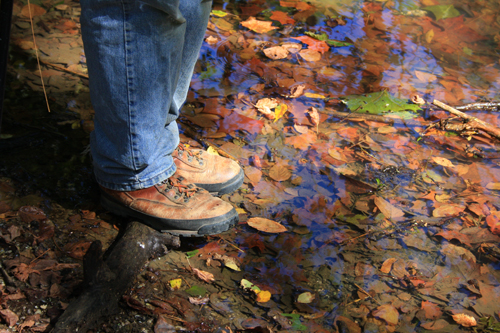
Autumn leaves, gathering in a pool of water.
(*photo credit)
September 28, 2019 Autumn Camping: Twelve Suggestions
Autumn camping is as much a possibility as tenting in spring or summer -- and falls can be mosquito- and tick-free. Autumn is neither too cold nor too hot; it is not as buggy as summer nor ever as icy as winter; nor is the area overrun by disturbers of the peace -- except for a few stray hunters. In fact, when the Indian summer is right, this place is ideal and missed by vacationers. Even though I am saying goodbye to camping here are tried and true suggestions:
1. Dress and bed down warmly for nights and early morning camping, for it is turning cooler and frosty;
2. Colors are coming on full so bring the camera or painting gear, or just accept the color as a passing glory;
3. Days are getting shorter, so time your sleeping so that the early morning sunrise is welcomed in all its autumn splendor;
4. Observe the wildlife, for everything from departing birds, spiders with extensive webs, and scurrying squirrels seems to be doing the equivalent of cutting firewood for winter;
5. Take along insect repellant, for you may encounter the lingering yellow jacket or other disturbing creatures;
6. Make an extra effort in choosing a good tent site. With fewer people the choices may improve. Ideally the land should be well-drained, airy, quite scenic, fairly quiet, somewhat protected, and pollution-free. No site is perfect, but a little more searching before bedding down will improve matters;
7. Discern whether access by auto is a good thing. When one can pack materials easily, the distance may prove a welcome separation, for we are all too immersed in modernity;
8. This is generally "fire season," so consider ways of avoiding the campfire and yet obtain the same effects. One possibility is the camp light that allows evening chatting around a circle, and yet no combustion that would add to the pollution load occurs;
9. Take along a pen and notebook. Now is the time of year when the reflections you always wanted to write can be recorded;
10. Take along some fruit of the season (apples, late peaches, early pears, papaws, early fallen persimmons);
11. Take caution about water quality and quantity; and
12. Leave the cell phone at home or at least in the auto. A good suggestion for the overly connected!
Prayer: Lord, help us find time to enjoy the autumn scene.

Spider finds resting place on rose.
(*photo credit)
September 29, 2019 Lazarus and the Wages of Affluence
Only in Luke's Gospel do we hear about the rich man and Lazarus (Luke 16: 19-31). It is a vivid tale that causes us to cringe and feel uneasy -- and isn't that what it is supposed to do? We need to confront our comfort zones and ask whether we are more on the side of the rich man than on that of the destitute Lazarus. We are haunted by the fact that the rich man knows Lazarus by name and sees his condition, but he passes him by. Do we do this with those with whom it may be uncomfortable?
The story of Lazarus is meant for us, not just as individuals but for us as Americans who have a wealth of resources -- and with beggars (e.g., Haitians) at our door. Does this story say something about each of us as a member in a democratic society required to be responsible for the resources that we have gained, secured, extracted, processed and used in ways we decide and wish?
Lazarus, virtually the only named person in the parables, challenges us down through the ages. We are in a rich land, and poor little Haiti is at our door step. Furthermore, with television bringing scenes to our homes, still one billion hungry people are at an ever-widening doorstep. These hungry folks crave the massive amounts of food wasted in America or the pet food used by our animals for that matter. One billion go to bed hungry tonight, and that is a form of terrorism we can so easily overlook.
The risen Christ tells us how to live and why we must be sensitive to the needs of our fellow human beings. The affluent can easily fall into becoming insensitive to others in need, and thus associated with the rich man's brothers in the parable. Are we as audience to lost souls calling for some dramatic shaking of our collective affluent boots? If we pay attention we find that the parable tells another dramatic story -- that the message of salvation has already been told, and that many are insensitive.
Some may contest coupling affluence with the term "sinful." Affluence dulls us to needs of others and makes us insensitive to their plight while we focus on further wanted items. Jesus will confront us with this at our judgment. The failure to see or experience the needy in our midst is the heart of the Lazarus parable; this strikes us deeply as people who have excesses beyond the reckoning of past generations. It is not a sin of commission, but one of omission. How can we shake people addicted to consumer goods and help change them to simpler ways? What must be done in the precious time that remains? Maybe the more challenging question is -- what will move us to become aware before it is too late? Why do ISIS terrorists hate American practices so much? Is it because they covet the things we have, or do they fear the power of a consumer culture to influence their own people?
Prayer: Oh, gentle Bonder of the Universe, bring our family closer together and cement our growing togetherness with your kindly love. Teach us to see the needy and share from our bounty.

Autumn sneezeweed (Helenium autumnale).
(*photo credit)
September 30, 2019 Poem: Times Are Changing
Events always make us aware that time does not stand still, but every moment is different from all past or future ones. No one recalls even a fraction of those moments of their lives. We certainly do not remember our birth and first few years. However, much of who we are is marked by occurrences during those early moments of life. The year 1933 stands out for me as my entry year. On an autumn day Dr. Pollock, our family physician, held up the folding money (I do not know how much) that Daddy gave him for my successful delivery at our home. In that Depression period the good doctor admitted it was the first folding money he had seen that month, and it was the last day of September; before, there had been payments only in chickens and hams.
I would like to admit to being happy with my years and announce the number when asked. The average American male born this year is expected to live to be 75, and my age has just exceeded that by a decade. Thus each passing day is a double gift, first life itself that is God's great blessing to us, and then the added time to repair some of the damage done to our troubled world by me and others. Each misdeed has done damage to the social order. Our awareness of past and current wrongdoing makes us anxious to help fill up what is wanting in the sufferings of the Lord for his body the Church -- and any added time is when we encourage others to perform good deeds as well.
Times are Changing
Labor Day and all's quiet after summer play,
Blooming ironweed, goldenrod in colored array;
Good smells at garden harvest time,
farmers' markets at their prime;
First autumn chill, longer cool nights,
foggy valleys, misty lakes, cloudy heights;
Flocking birds in the evening breeze,
seeming to overwhelm the roosting trees.
Tomatoes get that late season taste,
and peppers appear as though post-haste;
Elderberries are not eaten raw, but why?
They're destined for a steaming pie.
Root cellars with butternut and winter squash,
and all sorts of apples, not just McIntosh.
Prepare the greenhouse for the frosty fall,
we all know well the autumn call.
Prayer: Lord, help us see each day as your gift to us, knowing that we are deserving of none and yet thankful for all. Make our todays better than our yesterdays, and help us prepare our tomorrows to be better than our todays. |